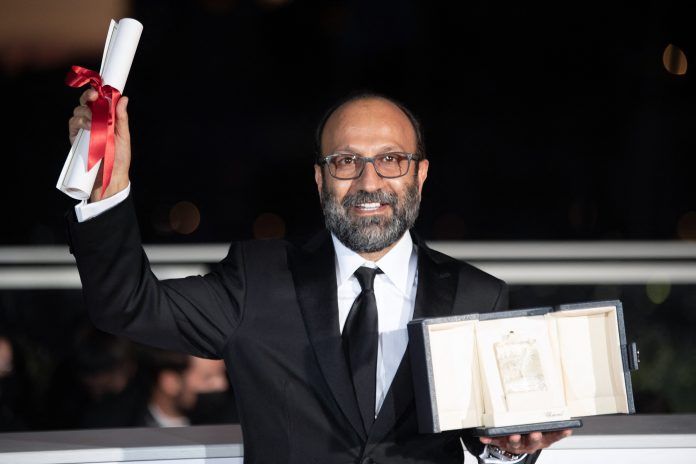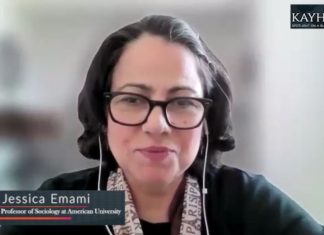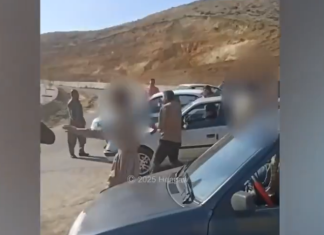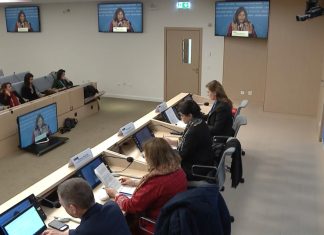
By Kayhan Life Staff
The world-famous Iranian director Asghar Farhadi has reportedly been summoned to appear in court in Iran over accusations of copyright infringement.
Azadeh Masihzadeh, a former student of Mr. Farhadi, has sued the director for allegedly stealing the idea for his 2021 film “A Hero” from her 2014 documentary “All Winners, All Losers.”
In an interview with Tehran-based Gozar News on April 4, Ms. Masihzadeh said: “Following a months-long, thorough investigation by the Culture and Media Court of my complaint against Mr. Asghar Farhadi regarding artistic plagiarism [moral and financial infringements], the honorable investigator found the evidence presented sufficient to issue a summons for Mr. Farhadi.”
[aesop_image img=”https://kayhanlife.com/wp-content/uploads/2022/04/filmfarhadi.jpg” panorama=”off” credit=” KL./” align=”center” lightbox=”on” captionsrc=”custom” caption=”Azadeh Masihzadeh (L), a former student of Asghar Farhadi (R).” captionposition=”left” revealfx=”off” overlay_revealfx=”off”]
Asked about the evidence presented to the investigator, Masihzadeh replied: “What ultimately led to the court issuing a summons was a dozen hours of footage, audio files, testimony by informed witnesses; a dozen documents showing contradictory comments by Mr. Farhadi, his lawyer, and witnesses, every one of whom changed their testimony; [Farhadi’s] previous comments during the investigation; and ultimately the decision by the knowledgeable and well-informed investigator who ruled after comparing both films.”
“The prosecutor’s office approved the 18-page summons issued by the esteemed investigator on March 18 and sent it to the parties involved on April 3,” Masihzadeh noted. “Mr. Farhadi filed two complaints against me. The first one was a defamation suit containing false claims filed against me on Nov. 6, 2021. He also filed a second lawsuit against me on Dec. 31, 2021, for defamation and publishing lies, after my comments about a handwritten note I had given under psychological duress and against my will. The prosecutor’s office ruled in my favor, deeming Mr. Farhadi’s evidence in both cases insufficient and, therefore, warranting no further investigation.”
Referring to Ms. Masihzadeh’s “handwritten letter,” Farhadi’s lawyer, Kaveh Rad, said: “Before the making of the film ‘A Hero,’ Azadeh Masihzadeh composed and signed a handwritten note in front of two witnesses at Bamdad Knowledge and Technology in which she clearly stated that the idea for the documentary ‘All Winners, All Losers’ came from Mr. Farhadi.”
However, Masihzadeh’s legal advisor — who wished to remain anonymous — argued that the investigator might have found her claims credible, given that they ruled in her favor in both cases.
Cannes Prizewinner Farhadi’s Pre-Victory Comments Spark Social Media Reaction
Farhadi’s “A Hero” tells the story of Rahim, played by Iranian actor Amir Jadidi, who is imprisoned for failing to repay his financial debts. While on a two-day furlough, Rahim finds a bag full of gold coins which he returns to its rightful owner.
Masihzadeh’s documentary “All Winners, All Losers” is about a painter whose character and story resemble the character of Rahim’s. Masihzadeh reportedly made her documentary during a workshop with Asghar Farhadi in 2014.
According to Farhadi’s lawyer Kaveh Rod, three complaints have been filed against his client, of which two are being investigated and brought by Ms. Masihzadeh, alleging “the violation of the author’s rights and claiming a share of the proceeds from the film’s domestic and global box office revenue.” The investigator has dismissed the third complaint, filed by a prisoner in Shiraz, claiming that the story of “A Hero” defamed him.
Rod explained that the case investigator did not accept the argument of the Quotation Right, supported by a wealth of similar domestic and international cases and the Directors Guild of Iran.
The Quotation Right is a copyright exception that allows the use of quotations from works (text, image, sound, film, etc.) provided that their making is compatible with fair practice.
“Despite Article 155 of the Code of Criminal Procedure and previous rulings by the Culture and Media Court in similar cases — entrusting the technical investigation to an expert in the fields of arts, cinema, and culture — the esteemed investigator based his decision on his interpretation of cinema as a matter of ‘belief’ and not expert opinion, and, therefore, did not refer the matter to an expert in cinema on author’s rights,” Rod argued.
Article 155 of the Code of Criminal Procedure states: “Whenever an investigator, directly or at the request of one party, deems it necessary to carry out an expert examination, he shall issue a referral order to the expert. The investigator must identify the issue that needs expert attention.”
Rod noted that the summons did not establish a final ruling in the case, but was “part of the overall process.”







